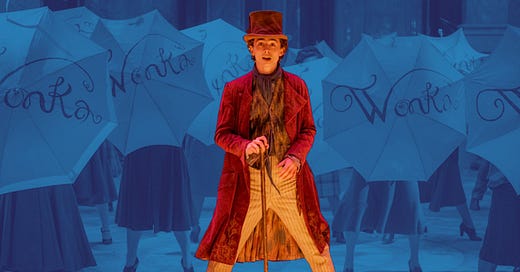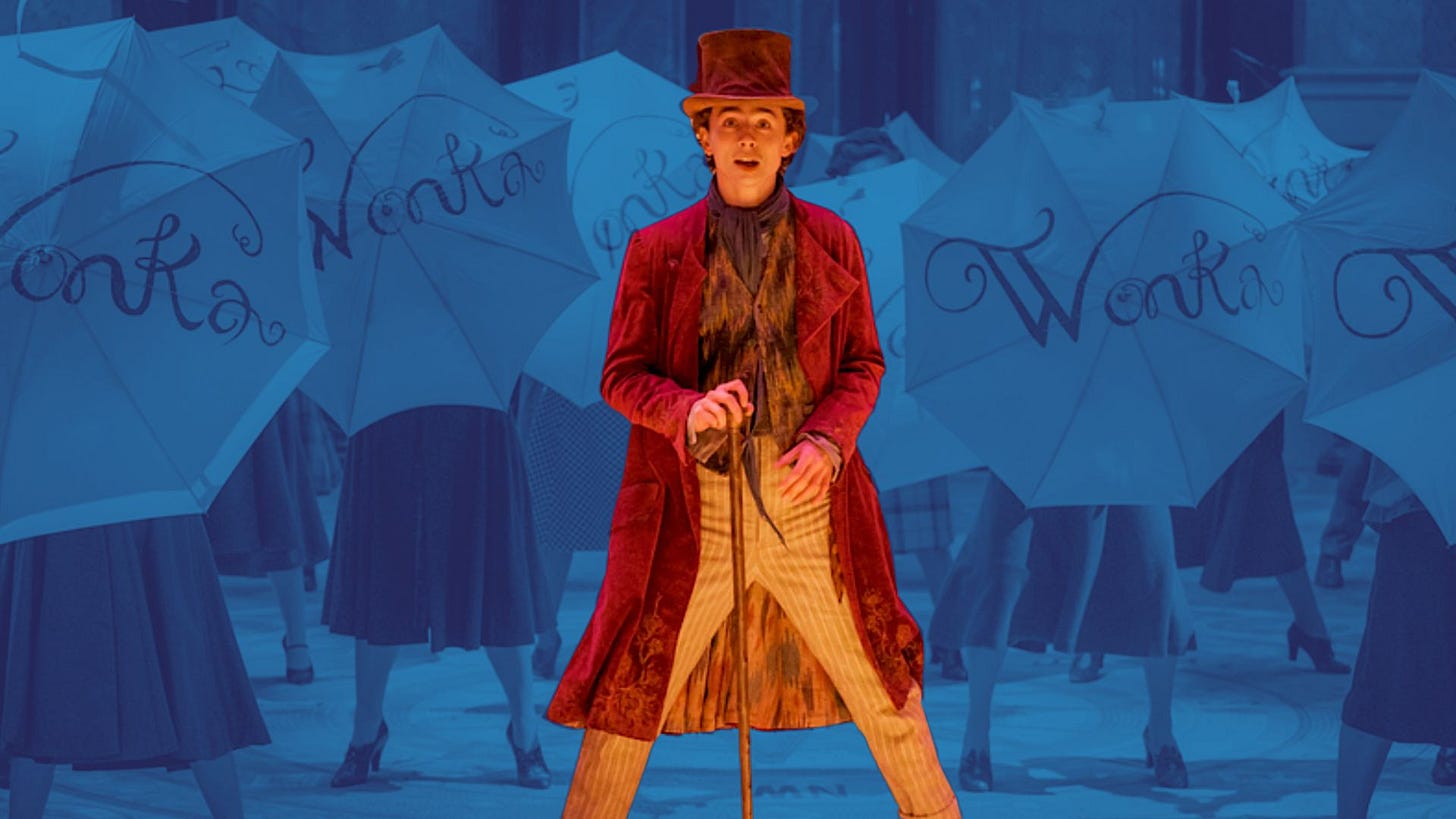Wonka's Pure Imagination for Nostalgia
One of my biggest surprises of 2023 was Paul King’s Wonka, a prequel to the Roald Dahl book (and subsequent movie adaptations) Charlie and the Chocolate Factory. The trailers didn’t sell me on the premise or the casting, I didn’t love King’s Paddington films, and I worried about the film’s tone, with marketing hiding the fact that it was a musical.
Those fears vanished the moment the film started. I was swept away by it all, the humor, the heart, the music. Timothee Chalamet puts on an incredible lead performance as Willy Wonka, and the tone of it all feels like a throwback to old Hollywood family musicals like Chitty Chitty Bang Bang or Mary Poppins.
One thing that really struck me though is how perfectly the film captured my nostalgia. It wasn’t a gimmick or a bunch of pointless Easter eggs, but the small callbacks and references to past Wonka films somehow had me more emotionally invested in the overall story.
I won’t linger long on the mannerisms that Chalamet effortlessly references in the film, but they were fun and impressive to watch. Whether through a wistful eyebrow raise reminiscent of Gene Wilder, or the sudden shouts and fast-talking manic activity of Johnny Depp’s version, he’s blending years of takes on the Wonka character into one unified performance. Even the script aids these mannerisms, from repeating the character’s unusual phrases (“Strike that, reverse it”), or Wonka’s knack for pedantic corrections (“‘Nearly’ is the key word there, Noodle”).
But beyond the main performance of the film, I want to focus on two aspects of the filmmaking - actions and music - that helped create a sense of nostalgia around my viewing experience.
Creating Nostalgia Through Actions
A simple, but effective way in which the movie referenced past Wonka films was through little actions that were reminiscent (or clearly intentional call backs) of earlier iterations of the character.
Some people would dismiss these as Easter eggs, and maybe they are, but they add so much quirk and character to both Chalamet’s portrayal and the film as a whole that I think they were important additions, though small. Just look at some of these choreographed callbacks, like Wonka walking backwards up steps or eating a teacup:
Some actions in the film even add new meaning to the 1971 film. Early in Wonka, Chalamet accidentally drops his last coin down the gutter. The film doesn’t linger long on this moment, meant more to symbolize his lack of resources to start the story, but astute viewers will remember Charlie Bucket finding a coin in the gutter in Willy Wonka and the Chocolate Factory, the coin that allows him to buy a chocolate bar with the golden ticket.
Now I can’t say whether this callback was meant simply as an allusion to those events or if it’s literally meant to be the same coin in both scenarios. But there’s something fun about the idea that Wonka, at a similarly destitute point in his own life, may have left behind the coin that enabled his future heir to come tour his factory.
Similarly, at the end of the film, we see Wonka open a chocolate bar left behind to him by his mother, who has passed away. She always promised she’d let him know the secret ingredient behind her chocolate making, but as he opens the bar, he sees a note written on a golden ticket (that’s right!) that reads “It's not the chocolate that matters; it's the people you share it with.”
It’s hard to say what events transpire between this prequel film and the events of the 1971 film that lead Wonka to become a more embittered, lonely man. But the implications of the note from his mother make the inciting incident of the original film even more meaningful. At some point down the line, a lonely Willy Wonka remembers his mother’s “secret” to success - sharing with others. And so he takes the very thing she used, a golden ticket, and decides he’s going to use that ticket to find someone in the world that he can share his chocolate-making with. It’s a beautiful moment in Wonka alone, but with even more added depth in the context of the fuller story.
Creating Nostalgia Through Music
I’m a film composer, so I’m always paying special attention to the music in any movie I watch. And so while the visual Easter Eggs did catch my attention when watching Wonka, I was even more drawn to the musical callbacks that they included in the film.
Wonka opens with a soft, sweet instrumental rendition of Pure Imagination over the studio logos and opening credits. A glockenspiel, harp, and piano all combine to create this beautiful, music box-esque sound. While slowing down old songs for nostalgic effect has been often maligned, particularly in trailers, I found its usage here to be wistful and evocative of childlike wonder, immediately putting viewers in the headspace to be whisked away on Wonka’s strange and wonderful adventures.
The musical score, in particular its orchestration, plays a huge part in the nostalgic wonder Wonka elicits. By scoring it like an old Hollywood musical, we’re hearing sounds we associated with a bygone era, an era that included the 1971 Gene Wilder Wonka film.
Even the new songs written for the film feel as if they could belong in the original 1970s movie. Just look at the structural similarity of the melodies in “Pure Imagination” and “A World of Your Own.” While just a few notes, when the audience is already in the headspace to expect that structure (and the song instrumentation is nearly identical), it immediately conjures those same feelings:
And of course, the film ends with a new rendition of “Pure Imagination.” Not for the sake of unearned recognition, but to actually add new meaning to the song. We see now that this song means so much to the character of Wonka. It means family, it means connection, it means dreams being realized and hopes being fulfilled. New meaning has been added to a familiar tune.
And that’s the key to nostalgia for me. It’s not rebooting something to create “aha!” moments. It’s not throwing in meaningless Easter eggs to get audiences watching closely. It’s using something that people are familiar with, and adding new meaning to it.








